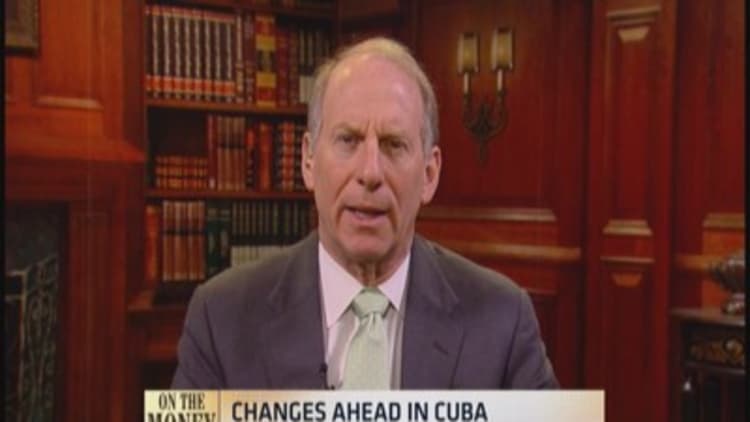
Two generations ago, Cuba was an American tourist destination. Loaded with sunny weather, beaches and casinos, Havana was a travel getaway just 90 miles away.
But in 1959, Fidel Castro's communist revolution put an end to a Cuba as a vacation spot for most U.S. citizens.
Last week, President Barack Obama surprised the world with an announcement that he had re-established diplomatic ties between the countries. So will Americans be rushing back to Cuba in the wake of the most significant thaw between the two countries in half a century?
Not so fast, says Richard Haass, president of the Council on Foreign Relations and a former State Department director of policy planning. "This is a first step, but in and of itself it is not transformational," he said.
Read More Cuba overhaul could backfire in big way: Gutierrez
Don't book those plane tickets just yet
For "people who want to go there to play golf, sit in the sun and smoke cigars, that's not going to happen at this point," Haass told CNBC in an interview. And the reason is fairly simple. A surge in U.S. travel to Cuba "will only come with the lifting of the embargo," he said.
Only Congress can agree to end the now more than 50-year-old economic trade embargo between the U.S. and Cuba, and Haass doesn't see that happening anytime soon. Obama's policy shift was greeted with widespread skepticism in Congress, where even one high-ranking Democrat denounced the move.
New Jersey Democratic Sen. Robert Menendez, a Cuban-American, said the move rewarded Cuba's "brutal" treatment of political dissidents, and set a "dangerous precedent."
Read More The Chinese cars that are changing Cuba
Because of the still-pervasive opposition to normal relations with the Caribbean island, Haass expects a step-by-step "testing period" where the U.S. will see if Cuba stops arresting new political prisoners or not, and assesses changes to Internet and telecommunications access.
Then, over the next one to three years, the expert foresees possible congressional hearings that may result in just a partial lifting of the embargo, but linked to political reforms including free and fair elections.
Still, the age-old economic and political isolation of Cuba has garnered critics across the aisle, many of whom have raised questions about its effectiveness. When asked if the U.S. policy change toward Cuba is the right move at this point, Haass said: "The argument is that 50 years of isolation and economic pressure sure haven't worked. So let's at least try this approach."
Haas compares restoration of diplomatic ties to a gamble, with the U.S. betting that an increased degree of engagement with Cuba will set in motion trends that will make the country more open.
As for the Cuban people, Haas believes their financial prospects will improve over time.
"At the end of the day, 11 million Cubans have far more at stake with the future of this bilateral relationship than 310 million Americans."
"On the Money" airs on CNBC Sundays at 7:30 p.m. ET, or check listings for airtimes in local markets.



